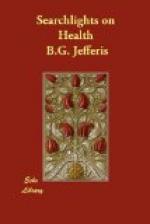5. Progression.—A large, respectable, though diminishing class in every community, maintain that nothing that relates exclusively to either sex should become the subject of popular medical instruction. But such an opinion is radically wrong; ignorance is no more the mother of purity than it is of religion. Enlightenment can never work injustice to him who investigates.
6. An example.—The men and women who study and practice medicine are not the worse, but the better for such knowledge; so it would be to the community in general if all would be properly instructed on the laws of health which relate to the sexes.
7. Crime and degradation.—Had every person a sound understanding on the relation of the sexes, one of the most fertile sources of crime and degradation would be removed. Physicians know too well what sad consequences are constantly occurring from a lack of proper knowledge on these important subjects.
8. A consistent consideration.—Let the reader of this work study its pages carefully and be able to give safe counsel and advice to others, and remember that purity of purpose and purity of character are the brightest jewels in the crown of immortality.
[Illustration: Beginning right.]
* * * * *
The beginning of life.
1. The beginning.—There is a charm in opening manhood which has commended itself to the imagination in every age. The undefined hopes and promises of the future—the dawning strength of intellect—the vigorous flow of passion—the very exchange of home ties and protected joys for free and manly pleasures, give to this period an interest and excitement unfelt, perhaps, at any other.
2. The growth of independence.—Hitherto life has been to boys, as to girls, a dependent existence—a sucker from the parent growth—a home discipline of authority and guidance and communicated impulse. But henceforth it is a transplanted growth of its own—a new and free power of activity in which the mainspring is no longer authority or law from without, but principle or opinion within. The shoot which has been nourished under the shelter of the parent stem, and bent according to its inclination, is transferred to the open world, where of its own impulse and character it must take root, and grow into strength, or sink into weakness and vice.
3. Home ties.—The thought of home must excite a pang even in the first moments of freedom. Its glad shelter—its kindly guidance—its very restraints, how dear and tender must they seem in parting! How brightly must they shine in the retrospect as the youth turns from them to the hardened and unfamiliar face of the world! With what a sweet sadly-cheering pathos they must linger in the memory! And then what chance and hazard is there in his newly-gotten freedom! What instincts of warning in its very novelty and dim inexperience! What possibilities of failure as well as of success in the unknown future as it stretches before him!




